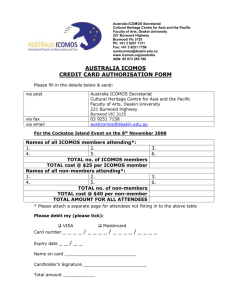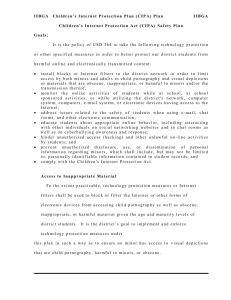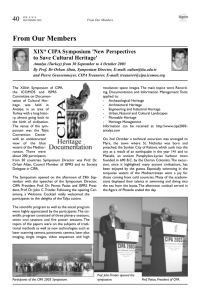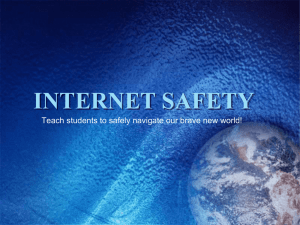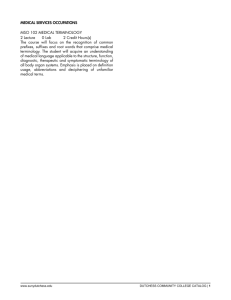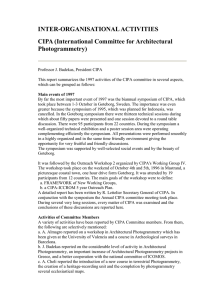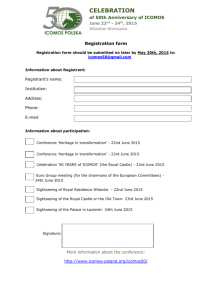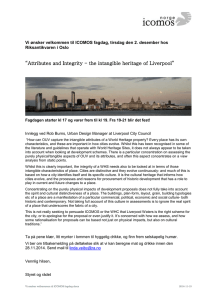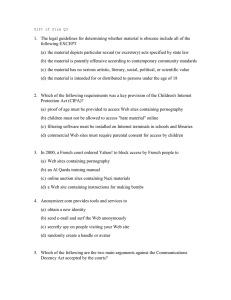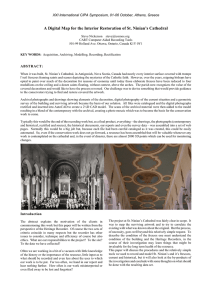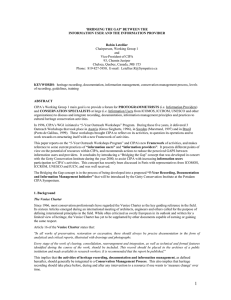Bridging-the-Gap Plenery Session at the CIPA Potsdam Symposium (Sept. 2001
advertisement
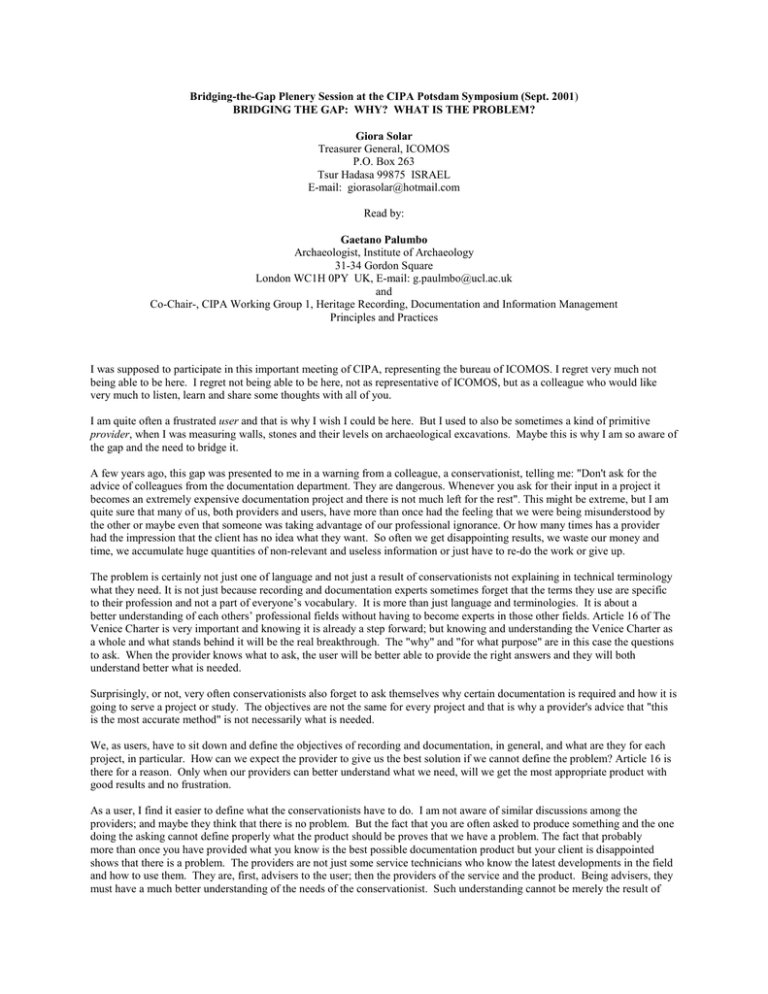
Bridging-the-Gap Plenery Session at the CIPA Potsdam Symposium (Sept. 2001) BRIDGING THE GAP: WHY? WHAT IS THE PROBLEM? Giora Solar Treasurer General, ICOMOS P.O. Box 263 Tsur Hadasa 99875 ISRAEL E-mail: giorasolar@hotmail.com Read by: Gaetano Palumbo Archaeologist, Institute of Archaeology 31-34 Gordon Square London WC1H 0PY UK, E-mail: g.paulmbo@ucl.ac.uk and Co-Chair-, CIPA Working Group 1, Heritage Recording, Documentation and Information Management Principles and Practices I was supposed to participate in this important meeting of CIPA, representing the bureau of ICOMOS. I regret very much not being able to be here. I regret not being able to be here, not as representative of ICOMOS, but as a colleague who would like very much to listen, learn and share some thoughts with all of you. I am quite often a frustrated user and that is why I wish I could be here. But I used to also be sometimes a kind of primitive provider, when I was measuring walls, stones and their levels on archaeological excavations. Maybe this is why I am so aware of the gap and the need to bridge it. A few years ago, this gap was presented to me in a warning from a colleague, a conservationist, telling me: "Don't ask for the advice of colleagues from the documentation department. They are dangerous. Whenever you ask for their input in a project it becomes an extremely expensive documentation project and there is not much left for the rest". This might be extreme, but I am quite sure that many of us, both providers and users, have more than once had the feeling that we were being misunderstood by the other or maybe even that someone was taking advantage of our professional ignorance. Or how many times has a provider had the impression that the client has no idea what they want. So often we get disappointing results, we waste our money and time, we accumulate huge quantities of non-relevant and useless information or just have to re-do the work or give up. The problem is certainly not just one of language and not just a result of conservationists not explaining in technical terminology what they need. It is not just because recording and documentation experts sometimes forget that the terms they use are specific to their profession and not a part of everyone’s vocabulary. It is more than just language and terminologies. It is about a better understanding of each others’ professional fields without having to become experts in those other fields. Article 16 of The Venice Charter is very important and knowing it is already a step forward; but knowing and understanding the Venice Charter as a whole and what stands behind it will be the real breakthrough. The "why" and "for what purpose" are in this case the questions to ask. When the provider knows what to ask, the user will be better able to provide the right answers and they will both understand better what is needed. Surprisingly, or not, very often conservationists also forget to ask themselves why certain documentation is required and how it is going to serve a project or study. The objectives are not the same for every project and that is why a provider's advice that "this is the most accurate method" is not necessarily what is needed. We, as users, have to sit down and define the objectives of recording and documentation, in general, and what are they for each project, in particular. How can we expect the provider to give us the best solution if we cannot define the problem? Article 16 is there for a reason. Only when our providers can better understand what we need, will we get the most appropriate product with good results and no frustration. As a user, I find it easier to define what the conservationists have to do. I am not aware of similar discussions among the providers; and maybe they think that there is no problem. But the fact that you are often asked to produce something and the one doing the asking cannot define properly what the product should be proves that we have a problem. The fact that probably more than once you have provided what you know is the best possible documentation product but your client is disappointed shows that there is a problem. The providers are not just some service technicians who know the latest developments in the field and how to use them. They are, first, advisers to the user; then the providers of the service and the product. Being advisers, they must have a much better understanding of the needs of the conservationist. Such understanding cannot be merely the result of knowing the terminology; it must be deeper. We are not talking anymore about dictionaries, vocabularies and terminology but rather of partnership between experts from different disciplines, working toward common objectives. This is why each discipline must have a better understanding of the other, the reasons for the existance of the other, its ethics, philosophy and the way it thinks. It starts, of course, with admitting that there is a problem, along with the will to solve it and then working together on the solutions. Again, I regret very much not being able to attend this meeting, but we have much to work on and I am planning, as ICOMOS Delegete to CIPA, to be part of those of us who will work jointly on the better understanding of each others field, for the benefit of the cultural heritage. Giora Solar-ICOMOS
